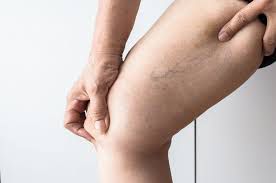
You may have caught sight of them in the mirror, those tiny, branching blue or red lines creeping across your thighs, calves or even your face. Known as web veins or spider veins, they’re small but undeniably noticeable.
For many, they are more than just a cosmetic bother. They can affect confidence, clothing choices and how freely one moves through the world.
Web veins, often caused by weakened or damaged valves in the veins, can be influenced by genetics, hormones, pregnancy, long hours on your feet or even sun exposure.
While medical procedures exist to eliminate them, not everyone is eager to leap into lasers or injections right away.
ALSO READ: Natural remedies we grew up with – Do they actually work?
The good news is that nature has provided us with gentle, affordable remedies that, with patience and consistency, may reduce the appearance of web veins and support vein health from within.
Here are three natural approaches that have been trusted across cultures to help manage and reduce the visibility of spider veins.
1. Witch Hazel
Witch hazel is a well-known herbal astringent used for centuries to reduce inflammation and soothe skin. What many don’t realise is that it can also help strengthen blood vessels and improve circulation, making it an excellent topical remedy for web veins.
How to use it: Soak a clean cotton ball in witch hazel and apply it directly to the affected area. Do this twice a day, once in the morning and once before bed. You can also keep it chilled in the fridge for a refreshing, anti-inflammatory effect.
Some people also use witch hazel in a homemade compress. Simply add a few tablespoons to warm water, soak a clean cloth, wring it out and rest it over your legs for 10–15 minutes.
Why it works: Witch hazel contains tannins and flavonoids, compounds that help reduce vein swelling, tighten the skin and soothe the inflammation around damaged blood vessels.
2. Apple Cider Vinegar
A staple in many kitchens, apple cider vinegar (ACV) is a favourite in the world of natural remedies. It is known to boost blood circulation and has anti-inflammatory properties that may help reduce the size and appearance of spider veins when used regularly.
How to use it: Soak a soft cloth or cotton pad in raw, unfiltered apple cider vinegar and gently apply to the area with spider veins. Leave it on for 20–30 minutes before rinsing. Do this once or twice daily for a few weeks.
Alternatively, some choose to add a tablespoon of ACV to a glass of warm water and drink it once a day, although results may vary when taken internally.
Why it works: Apple cider vinegar improves circulation and promotes detoxification. Better blood flow helps prevent blood from pooling in damaged veins, which is one of the main causes of web veins.
RECOMMENDED: 3 Homemade herbs to lower blood pressure quickly
3. Horse Chestnut Extract
Horse chestnut has long been used in traditional European medicine for vein and vascular issues. Rich in a compound called aescin, horse chestnut strengthens vein walls, reduces swelling and supports healthy circulation.
How to use it: Look for a topical gel or cream containing horse chestnut extract and apply it to the affected areas as instructed usually once or twice daily.
Some supplements also contain horse chestnut, but it’s important to consult a healthcare provider before taking it orally due to potential interactions.
Why it works: Aescin helps reduce fluid leakage and improves the tone of veins, making them less likely to bulge or become visible. Studies have found horse chestnut to be nearly as effective as some prescription medications for managing chronic vein issues.
Dealing with web veins can feel frustrating, especially when they seem to appear out of nowhere and refuse to fade. While quick-fix solutions exist, natural remedies offer a more gradual and gentle way to care for your skin and circulatory health. Remember, consistency is key.
These remedies aren’t overnight miracles, but with regular use, they can support your skin’s natural healing process and help you feel more comfortable and confident.
If web veins persist or worsen, it’s always wise to speak with a medical professional.
